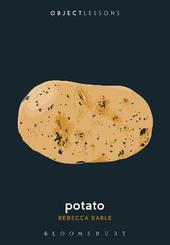
|
Potato
Paperback / softback
Main Details
| Title |
Potato
|
| Authors and Contributors |
By (author) Prof Rebecca Earle
|
| Series | Object Lessons |
|---|
| Physical Properties |
| Format:Paperback / softback | | Pages:144 | | Dimensions(mm): Height 165,Width 121 |
|
| Category/Genre | Literary theory
Philosophy - aesthetics
Popular philosophy |
|---|
| ISBN/Barcode |
9781501344312
|
| Classifications | Dewey:641.3521 |
|---|
| Audience | |
|---|
|
Publishing Details |
| Publisher |
Bloomsbury Publishing Plc
|
| Imprint |
Bloomsbury Academic USA
|
| Publication Date |
21 March 2019 |
| Publication Country |
United States
|
Description
Object Lessons is a series of short, beautifully designed books about the hidden lives of ordinary things. Baked potatoes, Bombay potatoes, pommes frites . . . everyone eats potatoes, but what do they mean? To the United Nations they mean global food security (potatoes are the world's fourth most important food crop). To 18th-century philosophers they promised happiness. Nutritionists warn that too many increase your risk of hypertension. For the poet Seamus Heaney they conjured up both his mother and the 19th-century Irish famine. What stories lie behind the ordinary potato? The potato is entangled with the birth of the liberal state and the idea that individuals, rather than communities, should form the building blocks of society. Potatoes also speak about family, and our quest for communion with the universe. Thinking about potatoes turns out to be a good way of thinking about some of the important tensions in our world. Object Lessons is published in partnership with an essay series in The Atlantic.
Author Biography
Rebecca Earle is Professor in History at the University of Warwick, UK. She is the author of three books, including The Body of the Conquistador: Food, Race and the Colonial Experience in Spanish America, 1492-1700 (2012), which was Winner of the Conference on Latin America History 2013 Bolton-Johnson Prize, and The Return of the Native: Indians and Mythmaking in Spanish America, 1810-1930 (2008), which was Winner of the Conference on Latin American History's 2008 Bolton-Johnson Prize Honorable Mention. She has written about the history of food for The Conversation, BBC History Magazine, The Independent, and The Sunday Telegraph, among other publications.
ReviewsPotato by resourceful Rebecca Earle gives us history, recipes, prayers of thanks, and family stories ... Each section educates, brings a smile, makes you hungry, and makes you think. * The Philadelphia Inquirer * Rebecca Earle ... intellectualizes the history of potatoes to portray the tuber's entanglement with the emergence of modernity, the birth of the liberal state, and with the idea that the individual is the basic building unit of society. The story of potatoes unfolding over the centuries bears a close resemblance with human stories replete with ordinariness, grit, prejudice, migration, and changing fortune ... Earle relies on history books, cookbooks, pictures, paintings, and posters to interweave human stories with the ups and downs of potatoes ... Earle has written a fine book, much in the tradition of ekphrasis, which burrows and shovels art objects to cultivate a piece of writing. * New York Journal of Books * Learn more about this staple tater through this engrossing report about its origin, development, and influence on our lives. * Manhattan Book Review * Rebecca Earle offers ideas that go far beyond the seeming simplicity of the humble spud ... [a] thought-provoking little volume. * The Irish Times * From its Andean home, the potato went almost everywhere in the world and thought about the potato went almost everywhere in the culture. Rebecca Earle elegantly follows the potato's travels through political economy, statecraft, nutritional science, gastronomy, religion, and literature. This is a marvellous historical mash-up of a food which did much to make modernity. * Steven Shapin, Harvard University, and author of The Scientific Revolution (2nd ed., 2018) and A Social History of Truth (1994) * Potato is a delight. Rebecca Earle writes vividly and with wonderful insight. Who could ever have thought that the entire world - cultures, ideologies, identity - could be decoded through the language of the humble spud? I'll never look at a potato the same way again. * Ruby Tandoh, author of Eat Up: Food, Appetite and Eating What You Want (2018) *
|